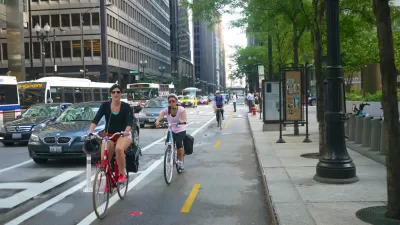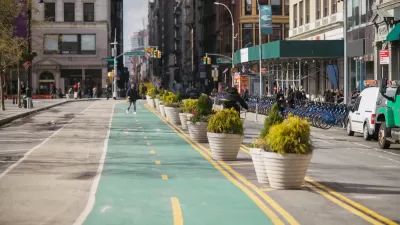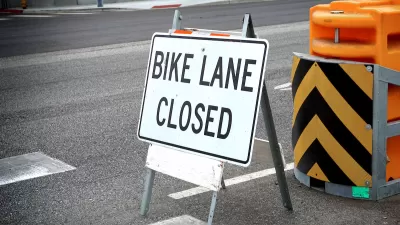Montreal city planners used a simple tactic to illustrate the small portion of area car parking that would need to be foregone in order to build a downtown bike path.

Every city that's ever considered removing auto parking to make room for a protected bike lane has been, understandably, nervous. North America's best city for biking wasn't immune.
But when it was planning its signature downtown bike project in 2005, Montreal got past those concerns with a very simple tactic. Instead of counting only the change in parking spaces on the boulevard De Maisonneuve itself, a measure that might have led to headlines and perceptions that "half of the parking" was being removed, it counted the total number of auto parking spaces — public and private, on-street and off — within 200 meters of the project.
The district, it turned out, had 11,000 parking spaces. Converting one of the corridor's two auto parking lanes to a protected bikeway would remove 300 of them, or just under 3 percent.
"The effect on the debate was suprise," said Jean-Francois Pronovost of Vélo Québec, the bike advocacy and planning nonprofit contracted by the city to study the issue. "No one estimated that there was that number of car parking [spaces] available."

FULL STORY: HOW MONTREAL BUILT A BIKE LANE BY DEBUNKING THE AUTOPARKOLYPSE

Maui's Vacation Rental Debate Turns Ugly
Verbal attacks, misinformation campaigns and fistfights plague a high-stakes debate to convert thousands of vacation rentals into long-term housing.

Planetizen Federal Action Tracker
A weekly monitor of how Trump’s orders and actions are impacting planners and planning in America.

In Urban Planning, AI Prompting Could be the New Design Thinking
Creativity has long been key to great urban design. What if we see AI as our new creative partner?

Portland Raises Parking Fees to Pay for Street Maintenance
The city is struggling to bridge a massive budget gap at the Bureau of Transportation, which largely depleted its reserves during the Civd-19 pandemic.

Spokane Mayor Introduces Housing Reforms Package
Mayor Lisa Brown’s proposals include deferring or waiving some development fees to encourage more affordable housing development.

Houston Mayor Kills Another Bike Lane
The mayor rejected a proposed bike lane in the Montrose district in keeping with his pledge to maintain car lanes.
Urban Design for Planners 1: Software Tools
This six-course series explores essential urban design concepts using open source software and equips planners with the tools they need to participate fully in the urban design process.
Planning for Universal Design
Learn the tools for implementing Universal Design in planning regulations.
Gallatin County Department of Planning & Community Development
Heyer Gruel & Associates PA
JM Goldson LLC
City of Camden Redevelopment Agency
City of Astoria
Transportation Research & Education Center (TREC) at Portland State University
Jefferson Parish Government
Camden Redevelopment Agency
City of Claremont





























